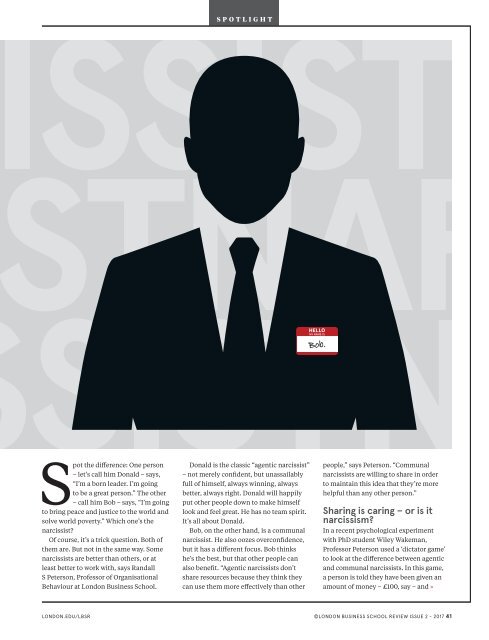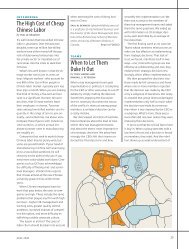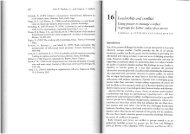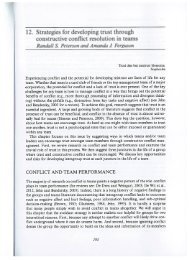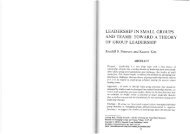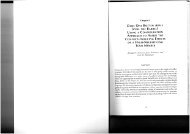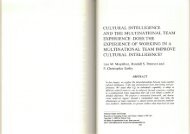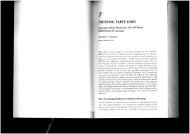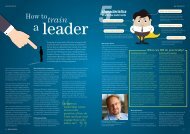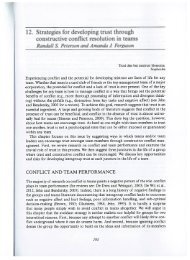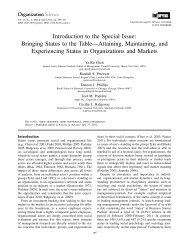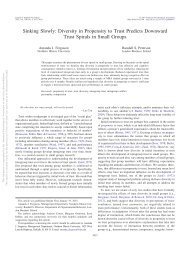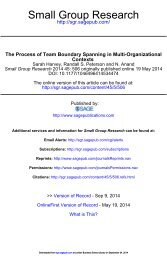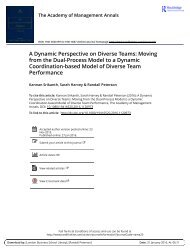When self-confidence is a curse
Not all narcissists need be nightmare colleagues, says Randall S Peterson. Learn to recognise the different types if you want to manage them successfully
Not all narcissists need be nightmare colleagues, says Randall S Peterson.
Learn to recognise the different types if you want to manage them successfully
- No tags were found...
You also want an ePaper? Increase the reach of your titles
YUMPU automatically turns print PDFs into web optimized ePapers that Google loves.
SPOTLIGHT<br />
Spot the difference: One person<br />
– let’s call him Donald – says,<br />
“I’m a born leader. I’m going<br />
to be a great person.” The other<br />
– call him Bob – says, “I’m going<br />
to bring peace and justice to the world and<br />
solve world poverty.” Which one’s the<br />
narc<strong>is</strong>s<strong>is</strong>t?<br />
Of course, it’s a trick question. Both of<br />
them are. But not in the same way. Some<br />
narc<strong>is</strong>s<strong>is</strong>ts are better than others, or at<br />
least better to work with, says Randall<br />
S Peterson, Professor of Organ<strong>is</strong>ational<br />
Behaviour at London Business School.<br />
Donald <strong>is</strong> the classic “agentic narc<strong>is</strong>s<strong>is</strong>t”<br />
– not merely confident, but unassailably<br />
full of him<strong>self</strong>, always winning, always<br />
better, always right. Donald will happily<br />
put other people down to make him<strong>self</strong><br />
look and feel great. He has no team spirit.<br />
It’s all about Donald.<br />
Bob, on the other hand, <strong>is</strong> a communal<br />
narc<strong>is</strong>s<strong>is</strong>t. He also oozes over<strong>confidence</strong>,<br />
but it has a different focus. Bob thinks<br />
he’s the best, but that other people can<br />
also benefit. “Agentic narc<strong>is</strong>s<strong>is</strong>ts don’t<br />
share resources because they think they<br />
can use them more effectively than other<br />
people,” says Peterson. “Communal<br />
narc<strong>is</strong>s<strong>is</strong>ts are willing to share in order<br />
to maintain th<strong>is</strong> idea that they’re more<br />
helpful than any other person.”<br />
Sharing <strong>is</strong> caring – or <strong>is</strong> it<br />
narc<strong>is</strong>s<strong>is</strong>m?<br />
In a recent psychological experiment<br />
with PhD student Wiley Wakeman,<br />
Professor Peterson used a ‘dictator game’<br />
to look at the difference between agentic<br />
and communal narc<strong>is</strong>s<strong>is</strong>ts. In th<strong>is</strong> game,<br />
a person <strong>is</strong> told they have been given an<br />
amount of money – £100, say – and »<br />
LONDON.EDU/LBSR ©LONDON BUSINESS SCHOOL REVIEW ISSUE 2 - 2017 41<br />
LBSR2_p40-43 Confidence CurseNM.indd 41 12/04/2017 10:12


